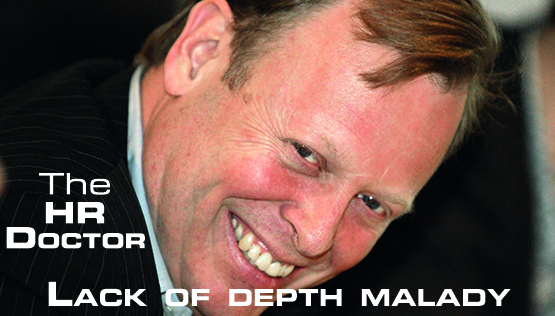 17.08.2020
17.08.2020
The HR Doctor 7:
Lack of depth malady
Af Nick Holley, Associate Director of Learning, Corporate Research Forum
|
Nick Holley er Keynote på Træfpunkt HR 2020 online, hvor han deler ud af sine diagnoser over de 10 ”sygdomme”, som han har set HR lide af i de 30 år, han har fungeret som praktiker, researcher, underviser og konsulent. Kan du genkende dem? Som optakt til Keynoten sætter vi fokus på de 10 sygdomme i ugerne op til Træfpunkt HR. |
When I spoke about easy way outosis I spoke about Strategic Dimensions. They raised another concern. They find people applying for senior jobs who lack real depth in their thinking about their roles. When interviewing for a Head of Comp and Ben role they asked one candidate if their organisation had an LTIP and if so why. The answer was ‘yes because everyone else has one’. This isn’t good enough. You need an understanding of the theory and practice that underpins HR. Good HR people are curious about their profession.
Symptoms
- This lack of depth is most critical in the most important area, HR’s understanding, not only of business in general, but of their business. It is pretty cheeky to call yourself an HR business partner if you don’t understand the business you are supposed to be partnering with.
- This lack of commercial acumen often results in HR being intimidated by the numbers. As a result some HR people see finance as the enemy as opposed to their key ally.
- In the worse cases HR lacks depth in the source of its expertise. They don’t know the basic HR models and don’t philosophise about HR.
- As a result when challenged there’s no depth. This is becoming a bigger problem as more and more books are published on people and HR related topics so that many line managers believe they are experts.
- Complications can really set in when HR suffers an attack of ‘compartmentalisation’ at the same time. If HR people lack technical expertise across the full breadth of HR they don’t join things up or see the implications of their actions on other aspects of HR. The result being they don’t connect or work together with other parts of HR.
- ‘Lack of depth malady’ can result in a severe dose of ‘oversimplicationitis’. There are many occasions when HR overcomplicates things but there are also times when HR oversimplifies things through a lack of understanding. As Einstein said “Make it simple enough but no simpler.”
- All of this leaves HR looking amateurish and lacking in credibility.
Impact
As with many of the diseases I have studied to date ‘Lack of depth malady’ can have a serious impact on HR’s credibility. As a result HR is kept in its ‘box’ and is never ever consulted on the important decisions where there are serious people implications. The danger is heightened by the presence of managers who have read a book and think they are experts resulting in the wrong diagnosis and the wrong cure for these people issues.
Example
I was working with one management team in a bank and their Chief Financial Officer told me about his HR Director colleague. At a meeting looking at a major investment decision the project was about to be nodded through when the HR Director who had been pretty quiet piped up: “Hang on a minute I’ve just been running through these numbers and this NPV (net present value) calculation is out. The denominator is wrong and when I’ve fed in what I think is the right number this is a negative NPV. Why are we agreeing to this?”
When the CFO checked the numbers the HR Director was correct. As he said: “It was a bit embarrassing for me, but he was dead right and I and the rest of the board have looked at him in a different light ever since”.
Cures
- If you have no understanding of business it is critical to go through a crash course, understanding critical concepts such as break even, fixed and variable costs, net and gross margins, net present value, cash flow etc. If any of these concepts either have no meaning, or even worse you see them as irrelevant to your role as an HR person, you really need to get real.
- Spend time in the business understanding the business. Look at the numbers, read the management accounts and if necessary, get a friend in finance to explain them to you. What are the critical numbers in your business? How do you get value for money? What is critical to your stakeholders?
- Develop systemic ways of thinking: don’t think in a linear way but look at how the different elements of the business and the HR mix link together.
- Invest time in your own professional development, read around the subject, go to conferences, and reflect deeply on the nature of HR, the art, the craft and the science. This has become a lot easier since I first wrote these articles. The internet, Google and social media have made it simple to keep up with the latest thinking. Every day I go on the internet and retweet articles about HR, strategy, leadership, the world of work etc. It doesn’t only mean sitting in a class room but seeing learning as part of our daily lives, about how we do our job not something separate to it.
Læs også
- The HR Doctor 1: Disconnection disorder
- The HR Doctor 2: Delivery deficiency
- The HR Doctor 3: Initiativitis
- The HR Doctor 4: Compartmentalisation
- The HR Doctor 5: Dominance Pathology
- The HR Doctor 6: Easy Way Outosis
- The HR Doctor 8: Me-me-me syndrome
- The HR Doctor 9: Action paralysis
- The HR Doctor 10: Hair shirtysm